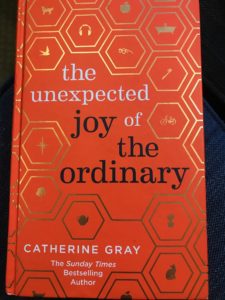Ordinary Wisdom
This morning I stepped out into my garden very early. There, I discovered a wonder — two zinnia plants that a week ago had been nothing more than sun-frazzled, over-exposed leaves doomed to die, had erupted into full-throated leading ladies. They made no bones about their presence there, bright little suns, beside the lavender just beginning to show their own lovely perfume violet wands.
Small joys, quietly observed, ease my way into days filled with harsh news and noise. I seek these few minutes each day like manna, looking for the grace that they offer, free of charge.
In this vein, I want to share several of the bright and helpful blooms in Catherine Gray’s book, the unexpected joy of the ordinary, sent me by a friend the other day.
Gray is a recovering alcoholic, at the tender age of 38, a former editor at the British Cosmopolitan, who reeled her way upwards, by her own account, on unbridled ambition fueled by our social disease, “the pursuit of the extraordinary.”
She writes convincingly about a phenomenon she (and others) call: the Hedonic Treadmill.
We all know it. More is better, until it isn’t enough. Then we reach for more. More things, more achievements, more praise, more money, more “good times.”
“The pleasure of acquisition is greater than the pleasure of possession,” she writes.
Next time we reach for the “place order” button on our laptops, we would do well to think about where we will store it, how we will clean it, whether it REALLY adds purpose and joy, or is just a way to relieve temporary anxiety of boredom.
And while we are talking about “more,” she shares a valuable item for those of us in quarantine who are chaffing at insufficient socializing — and also for those grateful to have less of it:
Behavioral science has discovered that we can have too many “friends,” and that when we do, we experience what is known as “role strain.” We feel like we are constantly changing the channel inside, reorienting to different wavelengths, subtle shifts in values, putting on different masks, or arming ourselves with different defenses.
The ideal number of close, close friends is — yes — 1 or 2. Outside of this inner circle, another 4 or 5 “intimate” friends (closer than acquaintances, but not as close as best friends or partners), is optimal for healthy functioning.
Two other bits, in the category of good habits to nurture: acts of kindness and expressions of gratitude.
On kindness: varying our acts of kindness does more to boost our sense of well-being than doing the same thing over and over again. (Calling or visiting parents is, of course, excluded from this principle!)
On gratitude: get specific. Not: “I’m grateful for this sunny day,”
but I’m grateful for the zinnias that, but for the grace of God, and rain and a bit of good luck, would not be blessing all who see them with their life force on this day when we need hope, recovery, and new growth.






No Comments